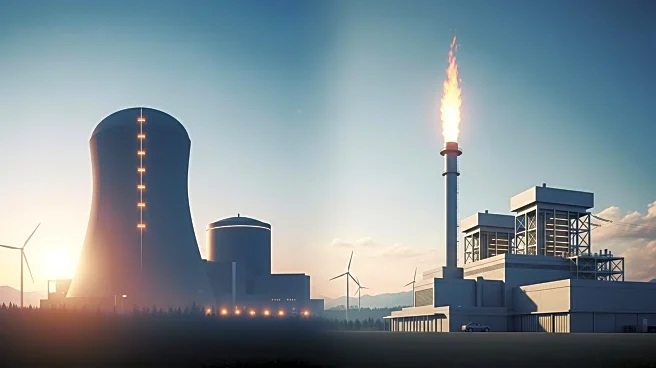What is the story about?
What's Happening?
Duke Energy has announced a strategic plan to expand its natural gas-fired generation capacity and explore nuclear power options to meet the growing electricity demand in its Carolinas service area. The plan includes adding approximately 9.7 GW of natural gas-fired capacity by 2033 and evaluating sites for new nuclear reactors in North Carolina and South Carolina. Additionally, Duke Energy will delay the retirement of certain coal-fired plants to ensure a stable power supply. The utility's plan, filed with state regulators, also outlines a reduction in solar energy expansion and a halt on offshore wind projects until at least 2040. This move comes as North Carolina's legislative requirements for carbon emission reductions have been relaxed, allowing Duke Energy to adjust its energy portfolio.
Why It's Important?
The shift in Duke Energy's strategy reflects broader changes in energy policy and market dynamics. By increasing reliance on natural gas and delaying coal plant retirements, Duke Energy aims to maintain low energy rates and support economic growth in the Carolinas. However, this approach has drawn criticism from environmental advocates and state officials who argue it undermines clean energy progress. The plan's emphasis on natural gas and nuclear power aligns with federal policies favoring these energy sources over renewables. This decision could impact the region's energy landscape, influencing job creation, investment in infrastructure, and the pace of transition to sustainable energy solutions.
What's Next?
The North Carolina Utilities Commission is set to hold hearings on Duke Energy's resource plan next year, with a decision expected by the end of 2026. The outcome of these hearings could lead to modifications in the plan, especially if there is significant public or governmental pushback. Duke Energy also plans to update its resource plan for South Carolina, incorporating insights from the current strategy. Stakeholders, including environmental groups and local governments, are likely to continue advocating for more aggressive clean energy targets, potentially influencing future regulatory and corporate decisions.















